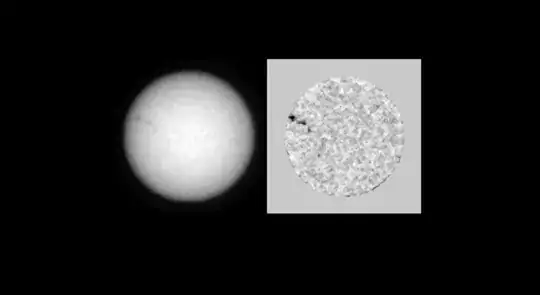Please remember that time is an arbitrary concept
Without any outside influence, the very first basis of time is the "day" consisting of a period of "light" and a period of "no light" that we Earthers more commonly know as "night."
- Day = one Light + one No Light
According to Space.com, the moons of Mars are so close to Mars that they cannot be seen from some latitudes.
...the bulge of Mars' own curvature gets in the way!
Deimos would appear to rise in the east and set in the west.... very.... slowly... while Phobos would appear to rise in the west and set in the east several times each "day". Worst of all, because of their closeness to Mars and the speeds of orbit, they have phases, but the phases occur much faster than we Earthers see with our own Moon.
Not that they're very visible. Deimos would appear to be only 1/19th the size of Luna in the Martian sky and Phobos would look like a slightly oversized Venus. Somewhat unimpressive.
Which means Martians might not develop the concept of a "month" at all.
Due to the orbit around the Sun and the Martian's ability to watch the stars, the concept of a "year" would develop. With the discovery of Mars' orbit, you would eventually discover the two solstices and two equinoxs, which means Mars is (perhaps) more likely to develop "quarters" as a replacement for "months". Kinda...since the orbit is elliptical the periods between solstice and equinox aren't equal.
As for periods shorter than the "light" and "no light" periods, that's REALLY ARBITRARY. Considering Earthers have ten toes and ten fingers it's a wonder they came up with two twelve-hour periods. But that might have been because the ancient Egyptians had two 10-hour periods plus two one-hour periods for twilight.
How many toes do your Martians have?
EDIT: Apparently there are some people who think the details are really, really important. They're not thinking from the Martians' point of view.
- 1 Martian Year = 1 orbit around the sun = "Year"
- 1 "light period" + 1 "dark period" = 1 "day"
- 667.99 "days" or just 668 days = 1 "year"1
- My Martians' have five fingers and one thumb and four bones per-finger, for 20 bones per "period" of a day for a 40 hour day. (Since hours weren't developed for astronomical reasons on Earth, I see no reason why they must be astronomically-based on Mars.)
- My Martian's have a religious requirement to rest on the 11th day so their week is 11 days long. Luckily, their pantheon has 15 gods, so each day of the week is named for one of them as are the two equinox and two solstice days.
Since Phobos would only appear like a fast-moving planet in the sky, the Martians really don't pay any mind to it (other than for historical purposes. They really did think it was a planet for a long time! Their astrolabes describing its "planetary" motion were very complex!).
Deimos, on the other hand, orbits Mars every 107 "hours"2. It's small and the phases are really hard for almost everyone to see, but it's motion is quite obvious. This caused the Obduracien Religious Wars in 1037 as they'd forgotten the number of hours came from counting bones in their hands and some people wanted to favor a lunar calendar over the traditional and now entirely religously-based Oburacien calendar. After the deaths of hundreds of thousands the scientists and religionists finally agreed that there would be a new division of time, the "month," which consisted of 200 days measured from the coincidence of moon-rise with sun-rise on the same day. To the scientists' great frustration, this lead to the new-age belief that the "lunar morning" of the 167th year brought about an alignment of day, month, and year that was truely harmonious! No one has tried to add the first day of the week to that mess due to a rumor that the scientists were going to use anyone who tried in some kind of acid experiment.
1 I was too lazy to care about the ratio of Mars' orbital speed to its rotational speed, so as an Earther, I cheated and worked out the ratio comparison from the Earth numbers.
2 Martian hours....

